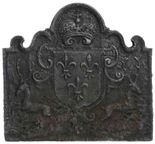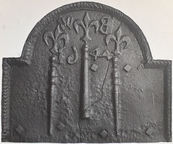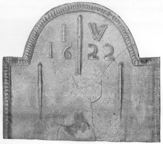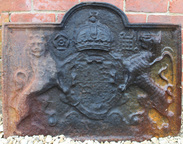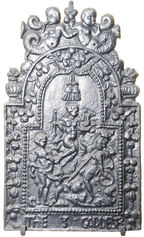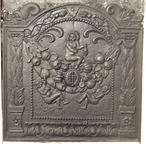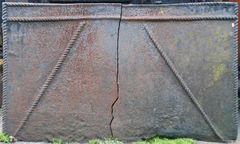-
937
Description: Arched rectangular shape; gadrooned edging (top and sides); initials, in separate stamps, at top of arch; date probably in separate stamps, below, split by spindle; spindle used as a stamp repeated three times, one between date and initial stamps, the other two below to left and right.
Notes: Makes use of the same backing board as other firebacks in this series, and the same three spindles but with other initials; it may originate in the Cuckfield area of Sussex, where most examples have been noted; illustration from Harper (1906). Previously at Riddens (now West Riddens) Farm, Ansty, near Cuckfield, Sussex.
Inscription: S WC / 16 22
- Decoration tags:
- rectangular with round arch (shape)
- gadrooned (edging)
- simple stamps
- individual letters
- individual numbers
- text
- objects
Manufactured: in 1622 possibly at Cuckfield Furnace in the Weald area of England.
Current location: not known.
Citation: Harper, C. G., 1906, The Brighton Road (London, Chapman & Hall), p. 391.
- Attached to series:
- Spindle series
- Spindle/distaff firebacks
-
824
Description: Rectangular with complex quasi-arched rectangular top; ovolo moulded edging; shield with Royal arms of France in a swirled cartouche; above, an English crown; below to right and left, a prancing stag.
Notes: The combination of the English crown and French arms is common and may relate to the marriage of Charles I and Princess Henrietta Maria of France in 1625; although the framing of the pattern is very similar to others of the same basic design, the style suggests a different pattern maker. Christie's auction 21 Jun 2011 lot 208 (£2,750).
Copies of this fireback are known.
Arms: France modern
- Decoration tags:
- rectangular with round arch (shape)
- ovolo (edging)
- whole carved pattern
- armorial
- animals
Manufactured: in the early- to mid-17th century possibly in the Weald area of England.
Current location: not known.
- Attached to series:
- Ornate border series
- Miscellaneous royal firebacks
- Anglo-French armorial firebacks
-
340
Description: Arched rectangular shape; gadrooned edging (top and sides); initials, in separate stamps, at top of arch; date in separate stamps, split by central spindle, below; two different spindles used as stamps, one centrally between splitting initial stamps, the other repeated twice on each side, slightly lower; above each spindle a fleur-de-lys stamp.
Notes: It is possible that the initials were intended to be 'BW' but that it was forgotten that they needed to be reversed when impressed into the mould. The same base board has been used for other firebacks dating from 1622 and 1632, and the central spindle can be be seen on another fireback of 1644. Purchased by J. H. Every at Bigges Farm, Cuckfield, Sussex, in 1918.
Inscription: W B / 16 44
- Decoration tags:
- rectangular with round arch (shape)
- gadrooned (edging)
- simple stamps
- individual letters
- individual numbers
- text
- objects
Manufactured: in 1644 possibly at Cuckfield Furnace in the Weald area of England.
Current location: not known.
Citation: Hughes, G. B., 21 Apr 1955, 'Old English Firebacks', Country Life, 117, pp. 1056-60.
Citation: Hughes, G. B., May 1940, 'Old English Firebacks', Apollo, 31, 185, pp. 117-120.
- Attached to series:
- Spindle series
- Spindle/distaff firebacks
-
1284
Description: Arched rectangular shape; gadrooned edging (top and sides); initials, in separate stamps, at top of arch; date probably in separate stamps, below; spindle used as a stamp repeated three times, one between date and initial stamps, the other two below to left and right.
Notes: The same base board and spindle have been used for other firebacks of the same period. A similar casting (no. 299) has the 'W' in a slightly different position. Formerly at Warnham Court, Sussex.
Inscription: I W / 16 22
- Decoration tags:
- rectangular with round arch (shape)
- gadrooned (edging)
- simple stamps
- individual letters
- individual numbers
- text
- objects
Manufactured: in 1622 possibly at Cuckfield Furnace in the Weald area of England.
Current location: not known.
Citation: Gardner, J. S., 1898, 'Iron Casting in the Weald', Archaeologia, 56, 1, pp. 133-164.
- Attached to series:
- Spindle series
- Spindle/distaff firebacks
-
1234
Description: Rectangular shape; overlapping laurel leaf on astragal edging; top centre, English royal crown above an arch-shaped laurel garland, the top tied with ribbon; beneath, a palm garland of the same shape but inverted, tied at the bottom, encircling twin letter Cs, one reversed; to left and right of centre, split date, 1667.
Notes: Perhaps commemorating the Peace of Breda which brought the Second Dutch War to an end, the twin letter Cs probably represent King Charles II and Queen Catherine. J. Starkie Gardner (1898, p. 152) misread the date as 1661 and interpreted it as celebrating the Restoration. A similar casting was lot 76, Simon Drieu & Co. auctioneers, Jersey, 20 Jul 2022.
Copies of this fireback are known.
Inscription: 16 67
- Decoration tags:
- rectangular (shape)
- overlapping laurel leaf (edging)
- whole carved pattern
- heraldic
- text
- plants
Manufactured: in 1667 in England.
Current location: not known.
Citation: Gardner, J. S., 1898, 'Iron Casting in the Weald', Archaeologia, 56, 1, pp. 133-164.
- Attached to series:
- Commemorative firebacks
-
862
Description: Canted rectangle; double fillet edging (top and sides); top centre, date between two flower heads; initials in triad, repeated on each side, with two fleurs-de-lys between; flower head below each initial group; small stamp of the figure of a stag below the date.
Notes: The initials are likely to be those of a husband (P) and wife (M) whose surname begins N. Illustration from Lenygon, p. 245.
Inscription: 1689 / PNM PNM [both triads]
- Decoration tags:
- rectangular with canted top corners (shape)
- double fillet (edging)
- carved stamps
- individual letters
- individual numbers
- heraldic
- text
- plants
Manufactured: in 1689 possibly in the Shropshire area of England.
Current location: not known.
Citation: Lenygon, F., 1914, Decoration in England (London, Batsford).
- Attached to series:
- Ludlow series
-
1016
Description: Arched rectangular shape; ovolo-moulded edging; Tudor royal shield within a cartouche, garter, crown, motto and supporters (crowned lion and dragon); Tudor rose to right of lion’s head, portcullis to left of dragon’s head.
Notes: The cartouche enclosing the shield is an unusual feature. A recasting. Mallam's auction, Abingdon, 9 Aug 2014, lot 1208 (£100).
Inscription: Garter and Royal mottoes [not legible]
Arms: Tudor royal (prob. Elizabeth I)
- Decoration tags:
- rectangular with round arch (shape)
- ovolo (edging)
- whole carved pattern
- armorial
Manufactured: in the mid- to late-16th century in England.
Current location: not known.
- Attached to series:
- Tudor royal armorial firebacks
-
520
Description: Arched rectangular central panel with bead edging; with tassel at top; three nude female figures: on top, Juno/Hera with a peacock, to the left Venus/Aphrodite, the young cupid/Eros at her feet, to the right Minerva/Athena with spear and shield; arched rectangular border with fillet edging; the heads of two putti and from them two suspended festoons of fruit and leaves; at the bottom, the inscription, THE 3 GODDESES, widely spaced. On top, two figures of Triton blowing seashells. On each shoulder of the fireback, a fluted vase with flowers issuing.
Notes: The three eponymous goddesses are those whose beauty was the subject of the Judgement of Paris. The composition is copied from an engraving by Adriaen Collaert (c1560-1618). This fireback is an instance of a continental back which has been recast in England, the opportunity being taken to insert an English inscription in place of the customary date and pattern maker's monogram. Mitford collection, Petworth House.
Copies of this fireback are known.
Inscription: THE 3 GODDESES [sic]
- Decoration tags:
- 'Dutch' (shape)
- fillet (edging)
- whole carved pattern
- planklines
- pictorial
- mythological
- text
Manufactured: in the late-17th century in England.
Current location: Petworth House, Petworth, West Sussex, England.
Museum number: NT/PET/M/74 (part of the National Trust museum group)
- Attached to series:
- 'Dutch' NDW series
- Judgement of Paris firebacks
-
591
Description: Arched rectangular shaped; cavetto-moulded edging; on each side a column of large overlapping leaves above a pedestal with a single rose; issuing from the top of each column two ribbons, in figure-of-eight with grenade terminals, fly across the arch; within an arched central panel with bead edging three naked children disport about a swag of fruit, with a central pomegranate, suspended from the top of each column; one figure sits on the top, facing right, the other two hang symmetrically from below; along the base is a line of acanthus leaves; on top a sea serpent is curled on each end.
Notes: The design may have been inspired by the paintings of Jan Pauwel Gillemans the younger (1651-1704); he may have worked in London in 1675-8. Another version (no. 575), probably by the same pattern maker, has a central finial on top and different proportioned fruit and figures. Copies of this fireback were advertised in Bratt Colbran Ltd.'s (London) catalogue in the early-20th century.
Copies of this fireback are known.
- Decoration tags:
- 'Dutch' (shape)
- cavetto (edging)
- whole carved pattern
- pictorial
- mythological
- humans
- plants
Manufactured: in the mid- to late-17th century in England.
Current location: Ham House, Richmond, Surrey, England.
Museum number: 1140116 (part of the National Trust museum group)
- Attached to series:
- Carolean 'Dutch' series
-
642
Description: Rectangular; twisted rope edging (top and sides); length of twisted rope parallel with, and equal to, top edge; length of rope, equal to side edge, repeated twice slanting from near top middle to bottom corners.
Notes: Very simple design using only two lengths of rope.
- Decoration tags:
- rectangular (shape)
- rope (edging)
- simple stamps
- objects
Manufactured: in the 16th century in the Weald area of England.
Current location: Mark Ripley Forge & Fireplaces, Northbridge Street, Robertsbridge, East Sussex, England.
- Attached to series:
- Rope design firebacks
.jpg)
